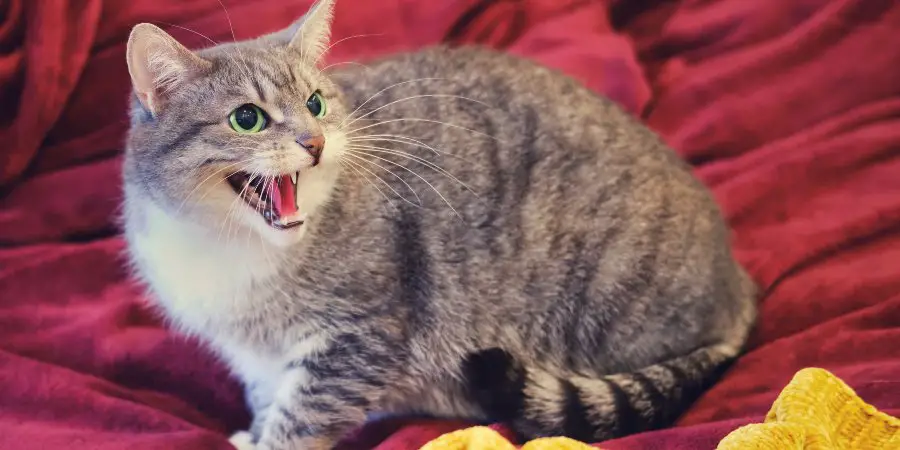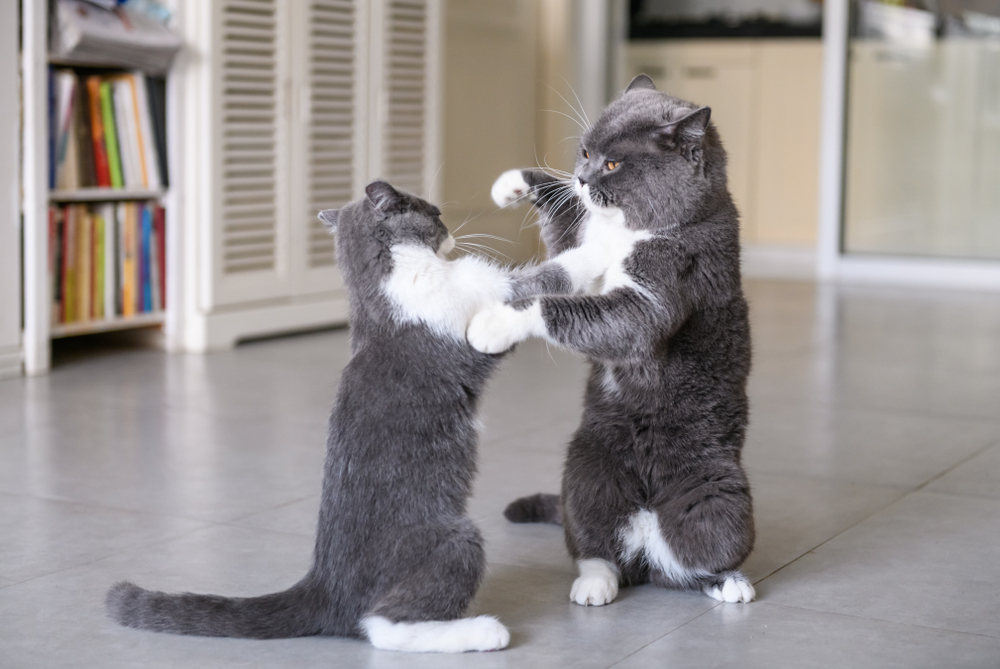As a cat owner or enthusiast, you might have noticed your feline friend hissing at you or other animals while playing. It’s a common behavior among cats, and while it may be alarming to witness, it’s actually a sign of their playful nature. But the question remains: can cats hiss when they’re playing?
The answer is yes. Cats commonly hiss during playtime as a way of expressing excitement or exerting dominance over their playmate. Understanding why cats hiss when playing can help you better understand your pet’s behavior and strengthen your bond with them. So, let’s explore the reasons behind this hissing behavior and what it means for your furry friend.

**Can Cats Hiss When Playing? – The Truth Revealed**
Cats are known for their playful nature, and they can often be found running around, chasing toys, and pouncing on anything that moves. However, sometimes their playful behavior can be mistaken for aggression, especially when they hiss. But can cats hiss when playing? Let’s find out.
**1. What is Hissing?**
Hissing is a sound that cats make when they feel threatened or scared. It’s a warning sign that they are feeling uncomfortable and want to be left alone. Hissing is often accompanied by other defensive behaviors, such as arching the back, flattening the ears, and showing the teeth.
When a cat hisses, it’s usually a sign that they are feeling stressed or anxious. However, hissing can also be a form of play behavior, especially when cats are playing with each other.
**2. Why Do Cats Hiss When Playing?**
When cats play with each other, they often engage in mock fights and other playful behaviors. Hissing can be a part of this play behavior, as cats may hiss to show that they are “winning” or to intimidate their playmate.
Hissing can also be a way for cats to communicate with their human companions during playtime. For example, a cat may hiss when they want their owner to stop playing a certain way or when they want to take a break from the game.
**3. Signs of Playful Hissing**
When cats hiss during playtime, there are usually some tell-tale signs that indicate that the hissing is part of their playful behavior. Some of these signs include:
– Tail wagging: If a cat’s tail is wagging while they’re hissing, it’s a good sign that they’re just playing around.
– Relaxed body language: If the cat’s body is relaxed and not tense, it’s likely that they’re just enjoying the game.
– Playful behavior: If the cat is still engaging in playful behaviors, such as swatting at toys or chasing after their companion, it’s a sign that the hissing is just part of the fun.
**4. Signs of Aggressive Hissing**
Although hissing can be a part of play behavior, it can also be a sign of aggression. Some signs that a cat’s hissing is not playful include:
– Tense body language: If the cat’s body is tense and their hair is standing on end, it’s a sign that they’re feeling threatened or scared.
– Prolonged hissing: If the cat continues to hiss for an extended period of time, it’s a sign that they’re not enjoying the interaction.
– Defensive behavior: If the cat is backing away, flattening their ears, or showing their teeth, it’s a sign that they’re feeling defensive and may lash out.
**5. Benefits of Playtime for Cats**
Playtime is an important part of a cat’s daily routine. Not only does it provide them with exercise and mental stimulation, but it also helps to strengthen the bond between cats and their human companions.
Regular playtime can help to reduce stress and anxiety in cats, which can lead to a happier and healthier feline companion. Additionally, playtime can help to prevent destructive behaviors, such as scratching or chewing on furniture.
**6. Hissing vs Growling**
While hissing is a common sound that cats make when they’re feeling threatened or scared, growling is another vocalization that cats use to communicate. Growling is usually a sign of aggression and is often accompanied by other defensive behaviors, such as flattening the ears and showing the teeth.
Unlike hissing, which can be a part of play behavior, growling is usually a sign that the cat is feeling threatened and may lash out. It’s important to be mindful of a cat’s body language and vocalizations to determine whether they’re hissing or growling.
**7. Conclusion**
In conclusion, cats can hiss when playing, but it’s important to be mindful of their body language and other vocalizations to determine whether they’re enjoying the interaction or feeling threatened. Regular playtime is important for cats and can help to promote a healthy and happy feline companion.
By understanding your cat’s body language and vocalizations, you can strengthen the bond between you and your feline companion and ensure that playtime is always a fun and enjoyable experience for both of you.
Frequently Asked Questions
Here are some common questions pet owners have about cats and their behavior.
Can cats hiss when playing?
Yes, cats can hiss when playing. While hissing is often associated with fear or aggression, it can also be a natural part of play behavior for cats. Hissing during play is often a way for cats to express excitement or to communicate with their playmate.
If your cat is hissing during play, it’s important to observe their body language and behavior to make sure they are comfortable and not feeling threatened. If your cat seems to be enjoying the play and is not showing signs of fear or aggression, then hissing is likely just a normal part of their play behavior.
Why do cats hiss during play?
Cats hiss during play for a variety of reasons. Sometimes it’s simply a way for them to express their excitement or to communicate with their playmate. Other times, hissing can be a sign of frustration or overstimulation.
It’s important to observe your cat’s body language and behavior when they are hissing during play to determine the cause. If your cat seems to be enjoying the play and is not showing any signs of fear or aggression, then hissing is likely just a natural part of their play behavior. However, if your cat seems uncomfortable or unhappy, it may be time to stop the play session and give them a break.
Is hissing during play a sign of aggression?
Hissing during play is not always a sign of aggression. In fact, it’s often just a natural part of play behavior for cats. However, it’s important to observe your cat’s body language and behavior to determine if the hissing is a sign of aggression or fear.
Signs of aggression may include flattened ears, dilated pupils, and a stiff body posture. If your cat is showing these signs, it’s important to stop the play session and give them some space. If your cat is hissing but seems to be enjoying the play and is not showing any signs of aggression, then the hissing is likely just a normal part of their play behavior.
How can I tell if my cat is enjoying play?
There are several signs that your cat is enjoying play. They may have a relaxed body posture, with their tail held high and ears forward. They may also make playful noises, such as chirping or trilling.
Additionally, your cat may initiate play behavior by pouncing, batting at toys, or engaging with you or another cat. If your cat is enjoying play, they will likely continue to initiate and engage in play behavior. If your cat seems uncomfortable or unhappy, they may try to avoid play or display signs of fear or aggression.
What should I do if my cat hisses during play?
If your cat hisses during play, it’s important to observe their behavior and body language to determine the cause. If your cat seems comfortable and is not showing signs of fear or aggression, then the hissing is likely just a natural part of their play behavior.
However, if your cat seems uncomfortable or unhappy, it may be time to stop the play session and give them a break. You can also try redirecting their attention to a different toy or activity to see if that helps. It’s important to always observe your cat’s behavior and body language during play to ensure that they are comfortable and happy.

Are My Cats Playing or Fighting? | Cat Playing vs Cat Aggression
In conclusion, cats are fascinating creatures that are full of surprises. While they may hiss when they are scared or angry, it is not uncommon for them to also hiss when they are playing. This behavior is often seen in kittens, who use hissing as a way to practice their hunting skills and to communicate with their littermates.
As a professional writer, I can say that cats are truly remarkable animals with unique personalities and quirks. Whether they are hissing or purring, they have a way of capturing our hearts and bringing joy to our lives. So the next time you see your cat hissing during playtime, don’t be alarmed. Instead, take a moment to appreciate their playful nature and the joy they bring to your life.
